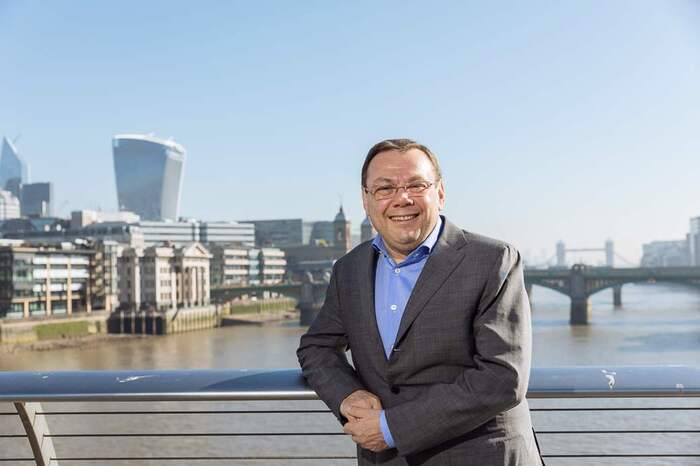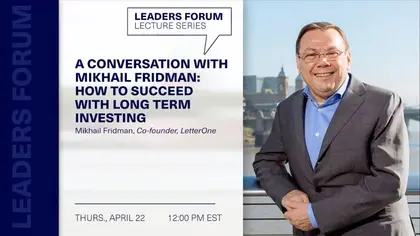A Conversation with Mikhail Fridman: How to Succeed with Long Term Investing
Leaders Forum
Thursday, Apr 22 2021 at 12:00 - 12:45 pm EDT
 The Dean’s Office invites you to join us as Mikhail Fridman, co-founder of LetterOne, the international investment company walks us through choosing investments wisely, taking risks, entreprenuership, what it takes to succeed, and taking a small company big.
The Dean’s Office invites you to join us as Mikhail Fridman, co-founder of LetterOne, the international investment company walks us through choosing investments wisely, taking risks, entreprenuership, what it takes to succeed, and taking a small company big.
After graduating from university with a first-class degree, Fridman started work as an entrepreneur. Together with several partners, he has built private businesses, from the bottom up, in retail banking, telecoms, insurance, and water. He is co-founder of the ABHH group based in Luxembourg, which invests in banking groups that provide retail banking services for more than five million people and has about 40,000 corporate customers. He also co-founded the Genesis Philanthropy Group, which develops and enhances a sense of Jewish identity among Russian-speaking Jews worldwide.
Moderator: Edieal Pinker, Chief Academic Officer, Deputy Dean & BearingPoint Professor of Operations Research.
In today’s fast-paced world, business leaders must be equipped to absorb new information nimbly and accurately if they want to succeed, according to entrepreneur and investor Mikhail Fridman.
“Your ability to learn new knowledge, quickly and open-mindedly,” Fridman told a Yale School of Management audience, “seems to me to be the main achievement you should gain from a university [education.]”
Fridman spoke on April 22 as part of Yale SOM’s Leaders Forum lecture series, which brings leaders from all sectors to Evans Hall to share their insights with students. Deputy Dean Edieal Pinker, Yale SOM’s chief academic officer and the BearingPoint Professor of Operations Research, served as moderator of the virtual discussion.
Fridman described his approach to choosing investments and taking risks, as well as his thoughts on entrepreneurship and the role of business in society.
Fridman is co-founder of the international investment company LetterOne. He has launched numerous businesses in sectors including retail banking, telecom, insurance, and water. He is also co-founder of the Luxembourg-based ABHH group, which invests in banking groups and provides retail banking services to more than five million people and 40,000 corporate customers. In addition, Fridman has launched the Genesis Philanthropy Group, which develops and enhances a sense of Jewish identity among Russian-speaking Jews worldwide.
As an investor, Fridman said, he targets “potentially gigantic businesses” with long-term prospects. He assesses three aspects of a business before investing: the strength of its strategy, its stakeholders, and whether the market—given its cyclical nature—is favorable to the proposed product.
Fridman stressed the importance of patience, consistency, and diligence when it comes to long-term investing. “We try to transform a company from a business entity to an institution in the market,” he said. “That definitely is a long-term strategy. ”
Describing his experience with the biggest food retailer in Russia, Fridman said that true success is reached when a business becomes indispensable in the lives of the population it serves; profits are just evidence of this relationship.
“The goal for business should be to become really an irrevocable part of the everyday life of people,” Fridman said. “Every country has things, on different scales, that are integral to the daily life of people.”
Fridman pointed to companies like Google, Facebook, and Apple as examples. “They’ve made things that you could not imagine living without now,” he said.
But understanding the local context is key to fulfilling customer need and desires, and Fridman said that it’s the responsibility of businesses to respect local cultures in order to become indispensable to the populace.
“Not every business can become an institution,” he said. But the dream of anyone starting businesses is “to build as many institutions” as possible.

